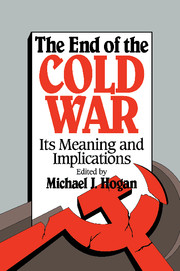Book contents
- Frontmatter
- Contents
- Preface
- The Authors
- Dedication
- 1 Introduction
- 2 An End to Which Cold War?
- 3 The Cold War, the Long Peace, and the Future
- 4 Quiet Cataclysm: Some Afterthoughts on World War III
- 5 Some Lessons from the Cold War
- 6 Nuclear Weapons and European Security during the Cold War
- 7 Victory in the Postwar Era: Despite the Cold War or Because of It?
- 8 The Wicked Witch of the West is Dead. Long Live the Wicked Witch of the East
- 9 The End and the Begining
- 10 A Balance Sheet: Lippmann, Kennan, and the Cold War
- 11 Why Did the Cold War Arise, and Why Did It End?
- 12 A View from Below
- 13 The End of the Cold War and the Middle East
- 14 The End of the Cold War in the Near East: What It Means for Historians and Policy Planners
- 15 After the Cold War: The United States, Germany, and European Security
- 16 The End of the Cold War: A Skeptical View
- 17 The End of the Cold War, the New Role for Europe, and the Decline of the United States
- 18 The Fading of the Cold War—and the Demystification of Twentieth-Century Issues
- 19 The U.S. Government, a Legacy of the Cold War
- 20 Foreign Policy, Partisan Politics, and the End of the Cold War
- 21 Beyond Bipolarity in Space and Time
- 22 A Usable Past for the Future
- Selective Bibliography
- Index
11 - Why Did the Cold War Arise, and Why Did It End?
Published online by Cambridge University Press: 18 December 2009
- Frontmatter
- Contents
- Preface
- The Authors
- Dedication
- 1 Introduction
- 2 An End to Which Cold War?
- 3 The Cold War, the Long Peace, and the Future
- 4 Quiet Cataclysm: Some Afterthoughts on World War III
- 5 Some Lessons from the Cold War
- 6 Nuclear Weapons and European Security during the Cold War
- 7 Victory in the Postwar Era: Despite the Cold War or Because of It?
- 8 The Wicked Witch of the West is Dead. Long Live the Wicked Witch of the East
- 9 The End and the Begining
- 10 A Balance Sheet: Lippmann, Kennan, and the Cold War
- 11 Why Did the Cold War Arise, and Why Did It End?
- 12 A View from Below
- 13 The End of the Cold War and the Middle East
- 14 The End of the Cold War in the Near East: What It Means for Historians and Policy Planners
- 15 After the Cold War: The United States, Germany, and European Security
- 16 The End of the Cold War: A Skeptical View
- 17 The End of the Cold War, the New Role for Europe, and the Decline of the United States
- 18 The Fading of the Cold War—and the Demystification of Twentieth-Century Issues
- 19 The U.S. Government, a Legacy of the Cold War
- 20 Foreign Policy, Partisan Politics, and the End of the Cold War
- 21 Beyond Bipolarity in Space and Time
- 22 A Usable Past for the Future
- Selective Bibliography
- Index
Summary
The fundamental underlying cause of the Cold War was the reinforcing belief in both the Soviet Union and the United States that confrontation was unavoidable, imposed by history. Soviet leaders believed that communism would ultimately triumph in the world and that the Soviet Union was the vanguard Socialist/Communist state. They also believed that the Western “imperialist” powers were historically bound to pursue a hostile course against them. For their part, American and other Western leaders assumed that the Soviet Union was determined to enhance its own power and to pursue expansionist policies by all expedient means in order to achieve a Soviet-led Communist world. Each side thought that it was compelled by the very existence of the other side to engage in a zero-sum competition, and each saw the unfolding history of the Cold War as confirming its views.
The prevailing Western view was wrong in attributing a master plan to the Kremlin, in believing that Communist ideology impelled Soviet leaders to advance, in exaggerating Communist abilities to subvert the Free World, and in thinking that Soviet officials viewed military power as an ultimate recourse. But the West was not wrong in believing that Soviet leaders were committed to a historically driven struggle between two worlds until, ultimately, theirs would triumph. To be sure, other motivations, interests, and objectives played a part, including national aims, institutional interests, and personal psychological considerations. But these influences tended to enhance the ideological framework rather than weaken it.
- Type
- Chapter
- Information
- The End of the Cold WarIts Meaning and Implications, pp. 127 - 136Publisher: Cambridge University PressPrint publication year: 1992
- 3
- Cited by



